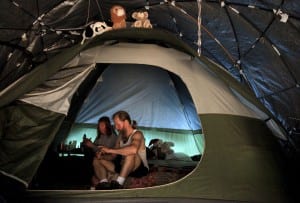 The Seattle City Council voted on Monday to approve a new city budget that includes money that could be used to provide Internet access at some of the city’s dozens of homeless encampments.
The Seattle City Council voted on Monday to approve a new city budget that includes money that could be used to provide Internet access at some of the city’s dozens of homeless encampments.
A $100,000 funding item on the 2015 budget was dedicated to improving conditions at homeless camps, and included such things as portable toilets, electricity, running water, garbage collection, cooking facilities and Internet access.
There was no decision on precisely how much money could go toward Internet installation or whether it would be available via traditional computer terminals or wireless.
Seattle’s socialist City Council member, Kshama Sawant, said Internet access would allow homeless individuals to look for jobs, communicate and keep up with news and current events.
“We are no longer looking at Internet as a luxury. We have to make sure we provide humane services for everybody,” she said last week after the item was added to the budget.
There are dozens of homeless tent cities, both small and large, around Seattle. A firm count of the encampments is hard difficult because they often move, splinter or shut down, a city official said.
The idea of Internet at homeless camps has been met with skepticism by some Seattle residents, who feel the money would be better spent on other initiatives.
“That’s too much opportunity for abuse,” resident Cindy Phillips told local television station KING 5. “There are public libraries, and other public resources such as WorkSource, that can better assist the homeless in finding the jobs, or other resources they need,” she said.
At a roving encampment known as Tent City 3, resident Aaron Ervin told the technology news site GeekWire that life would improve with Internet access.
“Everything is all about the computer,” he said. “Whether it’s sending out a resume or getting in touch with family members, it would open so many doors,” he said.
It was unclear how many homeless encampments might get Internet access. A city official said with the winter season approaching, other more pressing needs at the encampments were likely to be addressed before residents are able to surf the Web. [24×7]



















